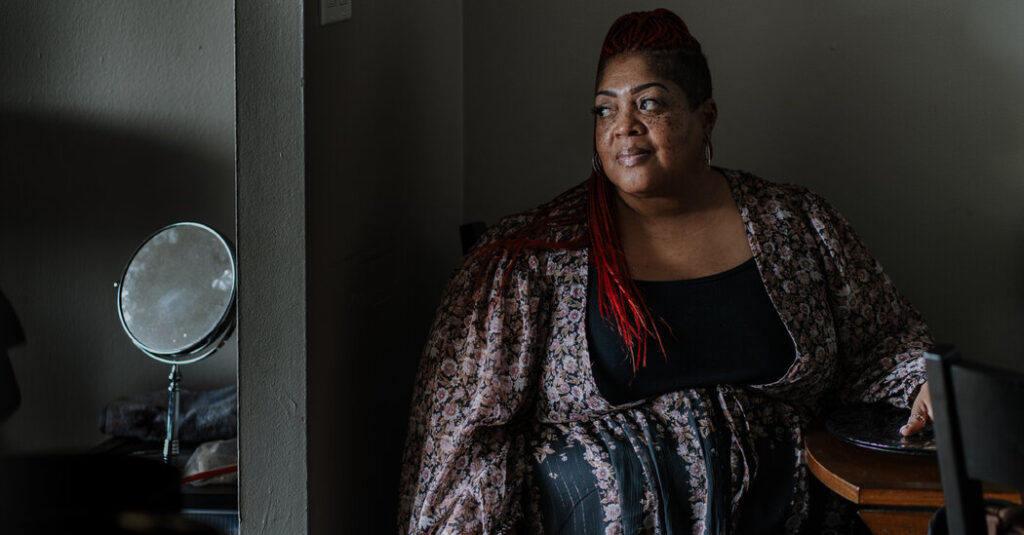
Catherine Lang was evicted from her apartment outside Chicago after the police saw her swerving in traffic and charged her with driving drunk. A jury found her not guilty, but by then it was too late.
Dalarie Hardimon was evicted after the police chased a man speeding in her van through a residential neighborhood.
And Catherine Garcia was ordered out of the townhouse she and her sons had lived in for 20 years. Their offense? Making too many 911 calls. Most of them came from Ms. Garcia’s intellectually disabled son.
The three women lived in Illinois cities that have adopted what are known as crime-free housing laws, local ordinances that empower the police and landlords to evict tenants who are accused of breaking the law.
The laws were promoted as a way to clear out violent criminals, drug dealers and nuisance tenants who made life miserable for their neighbors. But an investigation by The New York Times and The Illinois Answers Project shows that many cities in Illinois have turned crime-free housing programs into a blunt instrument to oust families for virtually any alleged infraction, no matter how minor.
In the most comprehensive statewide review to date, the news organizations examined cases in which renters were found to have violated the ordinances in 25 Illinois towns. Reporters interviewed dozens of landlords and tenants, and gathered police records. Ultimately they found more than 2,000 enforcement incidents across the state from 2019 to 2024.
City officials ordered landlords to evict tenants in nearly 500 of those cases.
The outcomes were unclear in most of the remaining cases because none of the cities tracked what happened after they sent violation letters. Landlords can seek an eviction even when cities do not demand it.
About a third of the 2,000 violation letters cited serious crimes. Landlords were ordered to evict or take other actions against renters caught in possession of drugs or charged with violent felonies. Sometimes, there were multiple accusations and a long trail of police interactions or neighbor complaints.
But a majority of the cases fell short of that. More than 1,300 were for misdemeanors or noncriminal offenses, many of which were never pursued by prosecutors. Most cities have crafted their laws so they can evict tenants even if the renters are never convicted of a crime, or never proved to have harmed their neighbors.
City police departments have ordered landlords to evict people over commonplace charges including shoplifting and driving while intoxicated. Renters have lost their homes based on accusations that they neglected their pets, failed to keep a close watch on their children and, in one case, eavesdropped on a neighbor. In many cities, a single violation was enough to trigger an eviction.
Enforcement of the laws often appeared to have little to do with protecting people from criminal activity next door. Hundreds of the infractions occurred somewhere other than at the rental property, including at gas stations and stores, or after traffic stops that occurred miles away from a tenant’s home.
It did not matter if the person accused was the leaseholder. Entire families have been forced from their homes after a child living there was accused of a crime, or a visitor was arrested. In at least five cases, renters were flagged because they had called 911 to get help or to report a crime that had been committed against them.
Officials in more than a dozen municipalities said that their crime-free programs were fair and that the laws had led to drastic reductions in 911 calls and reports of nuisances in rental communities.
Several noted that they had modified their programs over the years, often in response to complaints from landlords and renters, to ensure that only serious infractions led to evictions.
Matthew Eiskant, the chief of police in Belleville, said entire neighborhoods in his town, just outside St. Louis, have been “revitalized” by evicting just a few people.
“Our citizens are overwhelmingly in support of crime-free housing,” Chief Eiskant said.
But many cities, including Belleville, still have ordinances that allow them to seek evictions against virtually anyone the police suspect of breaking the law. Four landlords interviewed by The Times and Illinois Answers said they had each tried to help at least one tenant fight an eviction they thought was unnecessary or unfair. Enforcement records revealed many more cases in which landlords challenged evictions in hopes of keeping good tenants.
Mary Aviles, a landlord in Midlothian, a Chicago suburb, said she had called the police when she noticed a tenant had been leaving dogs caged in the home’s garage. While concerned about the dogs, she was shocked when the police ordered her to evict the tenants without warning; she felt the offense had not endangered others.
If she did not evict her tenant, Ms. Aviles faced fines up to $750 a day or losing her license to run a rental property, common penalties in most cities.
“It completely goes against the fundamentals of our justice system,” she said.
Housing advocates have long argued that the laws are discriminatory because they disproportionately fall on low-income residents and people of color. Tenants in several states have sued and won six-figure settlements against cities, some of which were accused of evicting Black tenants based on little more than vague suspicions called into the police by neighbors.
For years, Kate Walz, a lawyer in Chicago, and other housing advocates have sought legislation that would limit or ban crime-free housing programs statewide.
The latest effort, a bill being debated in the Illinois State Senate, would create sweeping regulations for the laws and make it more difficult for people to be evicted if they have not been convicted. The bill is scheduled for a Senate committee vote this week.
Ms. Walz said that the legislation would not solve all the challenges of crime-free housing programs, but that it would help protect renters from overzealous enforcement.
“There’s no supervision. There’s no education in terms of eviction laws or fair housing laws that they need to abide by,” Ms. Walz said. “Why would you do any other kinds of law enforcement, right?”
The Expansion of crime-free housing
Fear helped spread crime-free housing laws across Illinois.
In 2000, the Chicago Housing Authority began tearing down Cabrini-Green, a massive public housing complex that had been painted as a haven for crime. Elected leaders in the small cities encircling Chicago worried about where the displaced renters would move.
Officials in dozens of towns adopted the ordinances and launched training programs for landlords. Training presentations featured pictures of Cabrini-Green and slides warning that criminals would “grow like weeds” and “choke out healthy plants.”
Ms. Walz described a kind of arms race among the cities, which rushed to start programs so they would not be communities where supposed lawbreakers felt welcome.
More than 100 cities adopted the laws. One in four Illinois residents now lives in a place that compels renters to sign a lease contract that states a tenant can be evicted if accused of a crime.
Many cities require tenants to sign crime-free leases that are so broad that virtually any perceived violation could be grounds for eviction, even if the allegations are never fully investigated or proved.
In Orland Park, renters must sign a contract that says they can be evicted after a single arrest. “Proof of violation shall not require a criminal conviction,” the contract reads.
In DeKalb, a university town about an hour outside Chicago, rental contracts state that tenants can be evicted for any allegation, from a violent felony to a municipal code violation, which can include setting off fireworks or giving alcohol to a minor. The tenant is held accountable for anyone visiting the household, even if the tenant was unaware of the guest’s behavior, or unable to control it.
By 2015, enforcement in some Illinois cities had gotten so aggressive that state legislators passed a law barring city officials from evicting victims of domestic violence for calling 911. Some towns had been counting domestic assault reports at a given address and evicting everyone living there, including the victims.
Despite the reform, The Times and Illinois Answers found hundreds of instances in which cities ordered tenants evicted after a domestic violence call to 911, most of them in Belleville. Mr. Eiskant said his program has never evicted a victim of domestic violence.
But advocates point out that it is often difficult for the police to determine who the aggressor is in a domestic violence case. And sometimes a person accused of abuse is the primary breadwinner, meaning that if he or she is evicted, the entire family may have to leave.
Beyond the 2015 law, there is virtually no statewide oversight of crime-free housing ordinances, leading to vast differences in how cities apply the laws.
Among the 25 cities examined by The Times and Illinois Answers, most opened fewer than 10 crime-free cases a year from 2021 to 2024, and ordered evictions about a quarter of the time. With an average of 84 cases a year, Belleville was among the most aggressive. It required an eviction in every case.
And then there is Oak Forest, a city of 26,000 people just south of Chicago, where the police pursued an average of 178 cases a year, more than double any other Illinois city over that period.
‘Just Arresting People Wasn’t Fixing the Problem’
The Manchester Court Apartments rise up from a tangle of strip malls and residential buildings that make up the second ward of Oak Forest.
Hundreds of people live in the complex, many of them blue collar workers who take the commuter train to neighboring suburbs for cleaning and industrial jobs. For years, the cluster of three-story brick buildings had a reputation for being rundown and dangerous.
During a recent visit to the complex, Jason Reid, who retired in March as the chief of police in Oak Forest, described how it once operated like an open-air drug market, with shadowy figures loitering day and night. Residents, he said, were fearful of going outside.
These days, children wait for the morning bus with their parents, and play in the parking lot after school lets out.
“You wouldn’t have seen that 15 years ago,” Mr. Reid said. “Just arresting people wasn’t fixing the problem.”
In recent years, Oak Forest police officials have sent a steady stream of letters to property managers at the complex, informing them if tenants had run-ins with the police. The letters arrived more than once a month on average from 2020 to 2024; at least six cases required an eviction.
Across the city, crime-free enforcement was even more aggressive during that period. Since 2019, the city has sent about 1,000 notification letters to landlords, enough to give one to half of the rental units in the city.
Hundreds of the notification letters were about noise complaints; 32 were about animal welfare. At least two-thirds were for misdemeanors or noncriminal violations.
Like most cities, Oak Forest did not track how many notifications prompted landlords to evict tenants. But in at least 30 cases, city officials included language demanding that a landlord evict a tenant, usually over an alleged felony, a review of the letters shows.
Housing advocates said that cities like Oak Forest, in their rush to crack down on crime, have forced people out of some of the region’s only affordable housing and put them at risk of becoming homeless.
In 2021, Oak Forest police found a man overdosing on the floor of his apartment. The next day, police department officials ordered the man’s landlord to evict him. Last year, the police told a landlord to evict a family after a teenager who lived in the home was accused of stealing cars in Chicago with his friends. And at least four families were evicted after someone in the home was caught by the police smoking marijuana.
They all had just a few weeks to move out and come up with the money to move somewhere else.
Oak Forest’s ordinance grants landlords, but not tenants, the opportunity to appeal the city’s decision to issue a crime-free housing violation. Tenants can be left in the dark because city officials send violation letters to landlords and make no effort to communicate with tenants, or explain why the tenants have been targeted for eviction.
In cities that do offer renters a chance to appeal, tenants are generally on their own to hire a lawyer. In many cities, the person ruling on appeals is the police chief or the crime-free housing officer, who would have ordered the eviction in the first place.
Gail Diop, a former resident of Palatine, a suburban community northwest of Chicago, tried for weeks to convince the police her family had not violated the city’s crime-free housing laws in 2016.
In the end, she had to hire a lawyer and sue the city. Only then did she discover why the city had sought to evict her: A friend of her teenage son had been arrested on shoplifting charges at a Walmart, and had falsely given the police their home address as his residence.
The city stopped the eviction and offered Ms. Diop $10,000 for the error.
Ms. Diop eventually left Palatine because she was concerned her son would be targeted. “How can I respect officers of the law that would do people like this?” she said.
‘I’m a nuisance, I can’t call 911’
The appeals hearings in Granite City, a steel town near St. Louis, offer a window into what residents experience when they try to fight evictions under crime-free housing laws.
Audio recordings of 22 hearings from 2018 and 2019, obtained by lawyers who were suing the city, show that most tenants who were appealing did not have a lawyer or fully understand the proceedings. Some said they did not know what they or their family members had been accused of, or what they needed to prove to avoid eviction.
The hearings during that period were overseen by Scott Griffith, a former attorney hired by Granite City, who died in 2023.
The hearings — as many as 12 a day — lasted about 10 minutes. Tenants were told, often on the spot and for the first time, that they were expected to cross-examine the police officers themselves and to offer any legal objections to evidence that the officers had entered into the record.
Reginald and Monique Harris appeared lost at the start of their hearing in 2018. Their son, who was 18 at the time, had been arrested on charges of having cannabis in his pocket. They said they didn’t know anything about the incident because he was living on his own across the state line, in St. Louis.
At one point, Mrs. Harris burst into tears as she begged the hearing officer not to uproot the entire family, including her 11-year-old daughter.
Mr. Griffith rescinded the city’s order to evict.
Less than a year later, the couple was back. Their son had been accused of banging on a McDonald’s drive-through window so hard that it broke. He had left his drink inside, but workers ignored his knocks because they had closed.
It had been more than a year since the Harris’s son lived in the home. But old documentation still tied him to the address, and the family once again faced the prospect of being evicted.
The family took time away from work to go to the hearings and gathered mail and documents to make their case.
“We’re the kind of folks you want in your neighborhood,” Mr. Harris said during an impassioned eight-minute speech at the hearing. “This is not just residency on the line for me, this is my life,” he added. The family was let off the hook.
Many tenants choose not to appeal, because of the hassle or the belief that they would not win. Some cities do not provide for an administrative appeal, leaving tenants no option but to wait for a formal eviction notice and to fight it in court.
That’s the decision Catherine Garcia faced in 2023, when West Chicago officials told her she would have to move out of the modest rental she had lived in for 20 years. She moved out to avoid a formal eviction.
Ms. Garcia had raised her four boys in the townhouse. She loved the tree-lined streets and the relative quiet of being outside the big city. She said she always paid her rent on time.
But problems emerged as her sons grew up. Things came to a head in 2023, when two of the three adult sons who still lived with her began struggling with their mental health.
One son, diagnosed with a severe intellectual disability, constantly called 911 for issues like losing his mother’s phone number, or suffering a headache. Ms. Garcia said his frustrations sometimes erupted into violent fits and he would punch walls or push his family members, forcing them to call the police.
The other son had spiraled into a depression. He often threatened to end his own life, and Ms. Garcia felt she had no choice but to call 911 each time.
By the fall of 2023, officials in the West Chicago Police Department had had enough. The Garcias had called 911 more than 100 times in a year, and were labeled repeat offenders under the city’s crime-free housing law.
Ms. Garcia’s landlord gave her 10 days to move out. Her youngest son found the eviction notice posted on the door.
She could not afford the deposit on a new apartment, so she made plans to move into a hotel room across town for $700 a week. It cost twice what she had been paying for a fraction of the space, which she planned to share with three of her adult sons.
She spent days throwing out items her family had accumulated over 20 years: Christmas decorations; her sons’ youth sports jerseys; bedroom furniture her grandmother had left her; and the China cabinet, which she broke into pieces so the city could haul it away.
“I was just in depression and denial,” she said. “How could this be happening?”
The night before the Garcias were to move into the hotel, a friend offered a vacant home she owned in town. It was a financial lifeline, but the house needed work. The bathroom was unfinished and the furnace was on its way out. They spent a month sleeping on mattresses on the dining room floor.
A year later, Ms. Garcia, who works at a milk distribution company and gets financial help from her sons and their father, bought the house. She said her family was finding some balance, but there have been times when she felt she needed help and was afraid to call the police.
“I’m like, ‘oh my God, I’m a nuisance, I can’t call 911,’” she said.
Justin Mayo contributed reporting. Susan Beachy and Steven Moity contributed research.
This article was reported in partnership with Big Local News at Stanford University.
Reporting for this article was supported by a grant from the Richard H. Driehaus Foundation. Funders have no control over the selection and focus of stories or the editing process and do not review stories before publication. The Times retains full editorial control of this story.




